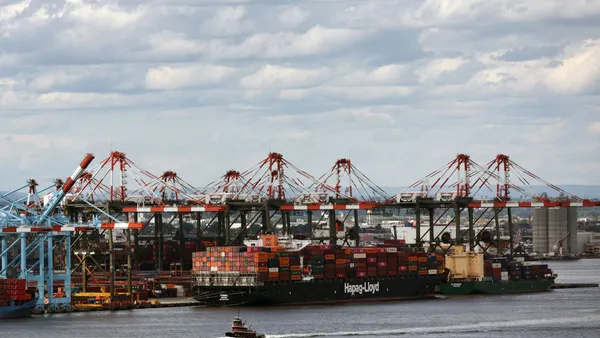Dive Brief:
- The total number of blanked sailings on the Asia-Europe and Transpacific routes has plateaued and some trips have been restored "as carriers see sufficient demand to warrant 'un-blanking' these sailings," Sea-Intelligence CEO Alan Murphy said in a weekly update.
- "THE Alliance is now re-inserting 2 sailings on the Transpacific which has previously been canceled," Lars Jensen, the head of consulting at Sea-Intelligence, said on LinkedIn. "This follows last week where THE Alliance also re-inserted four previously canceled sailings on Asia-Mediterranean."
- This change is fairly minimal and is not an indication of strong demand or a rebound, Murphy said. More blank sailings for July are expected in the coming weeks.

Dive Insight:
Hapag-Lloyd, a member of THE Alliance, said it began canceling trips in February as demand fell for transportation from Asia, the carrier said in its first-quarter financial report.
"Further reductions in departures as well as the temporary suspension of services are planned for the second quarter," Hapag-Lloyd said.
The plateau of blank sailings means shippers still moving cargo are working in an unreliable environment. Pim Altena, global head of partnerships at freight forwarder Flexport, said carriers have canceled sailings without taking into account other ports of call on the route, resulting in more missed transshipments.
When a carrier removes a direct connection, a shipper either has to delay their delivery timeline or turn to other transportation solutions like airfreight. "It just makes life a whole lot more complicated," Murphy told Supply Chain Dive last month.
Maersk, a member of the the 2M Alliance, said it expected demand to fall 20% to 25% in the second quarter across all its businesses, according to its first-quarter report released earlier this month.
The capacity cuts are meant to "maintain profitability and liquidity," as Hapag-Lloyd put it in its quarterly report. It has also allowed carriers to keep rates aloft, according to a weekly release from Freightos. Rates from China/East Asia to the U.S. West Coast are up about 25% compared to the same time last year, but rates from China/East Asia to the U.S. East Coast are down about 5%.
But carriers have started looking for additional financial assistance outside of blank sailings to keep rates up.
Earlier this month, CMA CGM was approved for a 1.05 billion euro ($1.15 billion) loan from three banks that is partially guaranteed by the French government. "This new funding further strengthens CMA CGM’s cash position in order to confront uncertainties in the global economy resulting from the health crisis and lockdown measures in a large number of countries," the carrier said in a press release.
Shefali Kapadia contributed to this report.














